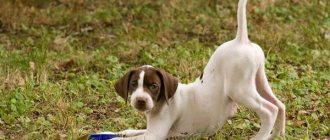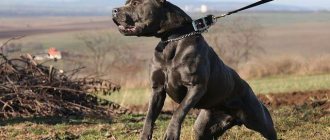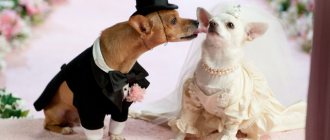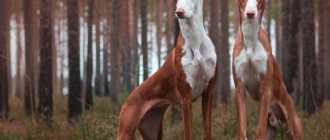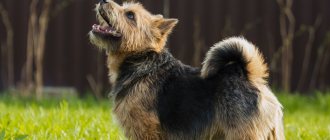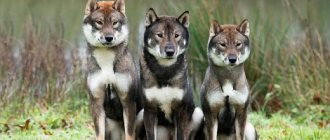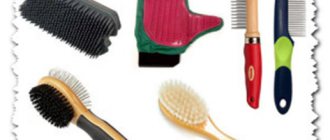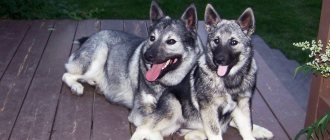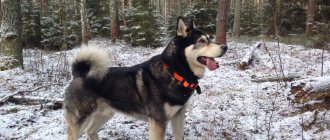History of the breed
This breed was first mentioned back in 1650 in Great Britain. The English Pointer was in high demand for hunting both wild animals and birds. Dogs of this breed were brought to Russia before 1914. Since then, their breeding has not lost its relevance. Such dogs are in demand now no less than then.
There was a lot of controversy about which breed was the fundamental one.
Experts agreed that the ancestors were the following breeds:
- greyhound;
- Foxhound;
- Bloodhound.
These breeds have been crossed with the Setter. This was necessary in order to improve bird hunting skills and curb his temper. At that time, representatives of this breed had a complex emotional attitude, which made their taming and education difficult.
The name of the breed was also born in England. The founder was the English word “point”. Translated into Russian, it means “to indicate.” It is enough to attend a hunt to understand that a pointer is truly a pointer. As soon as the pointer smells game, it takes a characteristic pose that indicates the direction of the prey.
Attitude towards children and others
Contrary to all instincts, the English Pointer adores children. The dog’s ability to control himself turns him into a nanny and a favorite toy for his younger owners. The dog will tolerate rough games.
The British treat uninvited guests with the famous English phlegmatism. When using a pointer as a guard, the owner should rely only on barking. The British hunting industry will not attack or zealously defend the territory. To use a dog as a watchman, you will have to undergo special training courses. In this way, the dog will be trained to behave correctly when threatened.
Description of the Pointer breed
According to standard data, the height of males of this breed varies between 57-65 cm, females - 54-63 cm, weight 19-30 kg. The following external data is accepted as standard:
- Pointers have a large head , with a wide skull that is slightly compressed between the ears. In the area of the bridge of the nose there is a small groove that divides the skull into 2 halves.
- The muzzle is wide, blunted towards the end, and can be straight or upturned. The eyes are small, the look is lively, intelligent. Most often there are individuals with dark eyes, but their shade depends on the color of the coat.
- The ears are set high, triangular, with hanging rounded tips.
- back , which turns into a powerful, slightly convex loin. The croup has a slight slope towards the base of the tail.
- The hind limbs of representatives of this breed are strong, with well-developed muscles, allowing the dogs to push off strongly while moving. In general, the limbs of Pointers are characterized by long thighs and lower legs, as well as pronounced articulations. The paws are oval in shape, with clenched toes, the pads are dense and thick.
- On the front paws of dogs, dewclaws are most often removed.
Color
Pointer puppies can be:
- Single-color (red, black, fawn, coffee).
- Bicolor (coffee piebald, yellowish piebald, black piebald, reddish piebald).
Rarely, there are representatives of the breed of two-color color with color spots located in a chaotic order.
What is the breed for?
The main purpose of the Pointer dog is hunting. This is inherent in her nature. Even without training, pointers cope well with their hunting duties, and instilling and practicing skills only increases the degree to which their innate abilities are demonstrated. If you get a pointer as a pet, be prepared that you will have to spend a lot of time together. The dog loves to move and play “hunt”. She only works in close contact with her owner, so you can’t avoid morning runs or long walks in the parks.
In a city apartment, the dog begins to get bored; the ideal place for an animal to live is a country house near a forest planting. When in contact with a person, dogs of this breed behave very attentively, they are affectionate and calm, and do not show aggression. Their love for children is caused by the increased activity of babies. With them, they can actively run and play without reacting to children's screams and pranks. Pointers are not suitable for home guarding. The dog is very sensitive and will always warn its owner about possible danger, but due to its good-natured nature it will not show much aggression towards a stranger. Do not forget that this is not a watchdog, and its main passion is hunting.
Mating
- Mating should not take place in a cramped room. If the dog’s territory is not spacious enough, then the pets are brought together in neutral conditions. A specialist is usually invited to resolve the issue.
- These dogs reach sexual maturity early, at about 8-10 months. But the body is fully formed only by 20-25 , so bitches cannot be bred for the first heat. The most favorable days are considered to be 13-15 from the beginning of the third heat.
- If the bitch is a breeding dog and there are pedigree documents for her, then a certificate for mating can be obtained from the nursery . A male is selected in advance. Both animals need to be rid of worms and fleas and examined for pathologies.
- Pets are introduced. To do this, they are either walked together or given 15-20 minutes to sniff each other. Sexual intercourse lasts 10-15 minutes, during which time the bitch is held by the head and under the belly, and the male is directed into the noose. The second fixative mating is carried out two days later.
Hunting Skills
In puppies, hunting skills manifest themselves extremely early, since innate instincts force the dog to pursue any animal running away from it. An ardent passion for hunting is a typical characteristic of the Pointer. Excitement can take over a pet so much that it runs far ahead in search of prey without hearing its owner.
There is no need to train young animals to do a stand; puppies do this on their own as soon as they smell game. They have been taken to the field since they were 2 months old, and they feel quite confident there. Animals are easy to train. The individual working qualities and hunting characteristics of these dogs make them excellent partners.
Most cops hunt intensively for no more than 6-7 years. Older animals are rarely taken into the fields, because they already have difficulty withstanding physical activity. Among all breeds of hunting dogs, the Pointer stands out for its special longevity. Excellent health and incomparable field qualities allow them to indulge in their passion until old age. Adult and experienced dogs of this breed are especially valuable, because over the years they improve and become virtuosos of the hunting craft.
Learning ability
The English Pointer is an independent dog and can become stubborn during training. They cannot be handled by a novice owner and only require an experienced owner who knows dog behavior.
The owner must establish firm leadership over them and earn their trust and respect. Use positive teaching methods to motivate them in training. Reward them with tasty treats and encouraging praise.
- The Pointer is an intelligent, obedient dog that tries hard to please their owners, but if they want to be the center of attention, they need opportunities to show it, which makes them great, kind family dogs!
- Pet lessons would be ideal for your Pointer. However, they should be taught reliable recall as they are easily distracted outdoors by the thrill of the chase or the sheer joy of running.
- Some can only be safely off-leash in enclosed, completely secure areas. The price of a Pointer dog mainly depends on the specific variety of this breed, as well as on the region of sale.
Features of hunting with a pointer
Pointers are a breed specially bred for hunting. These animals are quick to rise, hardy, picky and easy to train. They will be indispensable when hunting hare and poultry (partridge, pheasant, woodcock, black grouse, hazel grouse, quail). These cops are rarely used to work for waterfowl, because the animals do not like water. But on earth they are able to track down any animal.
Due to their short fur, dogs do not tolerate low temperatures well. Being in cold water can cause them to catch a cold. A short coat makes animals vulnerable to minor injuries and insect bites. Because of this, pointers feel uncomfortable in bushes and dense thickets, as twigs and branches can hurt them painfully. Although in the heat of hunting passion the pet will not pay attention to this.
This breed of dog is not afraid of the sound of a gunshot; the animals serve up trophies well. But large prey is too much for them, because their mouth is very small. In field conditions, their dormant instinct is fully realized, and they are able to tirelessly pursue prey. In a pack of dogs, pointers always try to stand out and compete with their comrades. Occasionally, conflicts may arise due to excessive arrogance, self-confidence and independence of leading individuals.
The dog looks impressive in the field. He moves gracefully and swiftly. More often he uses his upper senses and therefore runs with his head held high. The pointer instantly reacts to the smell of a bird with an extremely beautiful and bewitching stance. The peculiarities of hunting with cops include the undoubted aesthetic side, since dogs working in the field are unusually beautiful and harmonious.
Possible diseases
This breed of pet is prone to the formation and development of certain diseases, which the owner himself can prevent, if, of course, he pays enough attention to the health of his dog and regularly shows it to a doctor for diagnosis.
The most common diseases are:
1. Diseases that are associated with muscles and joints (articular dysplasia, arthritis). This can be explained by the large size of the dog and its constant activity.
2. Skin diseases, including allergic ones. Because of this, you need to be especially careful when choosing your dog’s shampoo and hair care products, as well as sprays against insects and ticks.
3. Eye and vision problems such as cataracts, corneal dysplasia, retinal atrophy.
4. Some dogs are prone to deafness and epilepsy.
If a dog’s disease is diagnosed in time and treated under the guidance of a doctor, then it does not pose any particular danger, and the animal will soon recover.
Pointer content
Nutrition
The basis of a dog's health is its diet. It is especially important for the Pointer, because only thanks to properly selected food will he be healthy, vigorous and physically developed.
To ensure proper nutrition, follow a few basic rules:
- The diet should be balanced.
- Food products must be of the highest quality (this applies to both natural and dry food).
- All necessary nutrients must be supplied to the dog's body in proper quantities.
- If natural products are used for food, vitamins and minerals should be included in the diet in addition to them. Although natural products may seem better, they cannot meet the daily requirement of nutrients needed to maintain a healthy Pointer.
Following these rules will provide a good opportunity to raise a healthy dog. A lot depends on nutrition: the dog’s character, its well-being, the shine of its coat and its health.
Where to buy and price
In the case of hunting breeds, pedigree is very important. It is a guarantee of the dog's mental health. If you buy a puppy second-hand, you may end up with a mixed breed or a mentally unstable dog. The manageability of Pointers is a quality acquired during selection, so you should not take a baby without a pedigree and documents. The best place to buy a puppy is an officially registered nursery. The Pointer is a common dog breed, so finding a qualified breeder should be easy.
Nurseries:
- Hell Fire Fields (Sergiev Posad);
- Hunter For Dream (Balashikha);
- Phil of Pride (Moscow);
- Born Hunter (Moscow).
On average, puppies cost from 30,000 rubles.
Care
No less important than proper nutrition is proper care for your Pointer.
To ensure that he always pleases the eye with his well-groomed and neat appearance, follow a few recommendations:
- To improve blood flow, sometimes give your pet a massage. His technique is very simple. Put a special massage mitten on your hand and stroke the dog's fur growth.
- Brush your dog 2 times a week using a rubber glove. Such regular actions will protect the house from excess hair, and will also get rid of it during the dog’s seasonal shedding.
- The Pointer's eyes and ears are at risk. Therefore, conduct a morning examination of these parts of the body every day.
- Before a walk, treat your pet's fur with a special product that will help repel blood-sucking parasites. This will protect the dog from diseases that are often carried by insects. For example, ticks are very insidious and are carriers of a terrible disease - tick-borne encephalitis. This disease is dangerous for both humans and dogs. Very often it leads to death. Therefore, after a walk, always examine your dog. If you notice a tick or other parasite on its body, contact your veterinarian.
- Visually inspect the Pointer's skin. They are predisposed to many skin diseases.
- If your pointer lives in a city apartment, try to take him to the forest or park for a long walk at least once a week. If this is not possible, the daily walking time should be longer.
These simple recommendations are available to everyone. Don't neglect them if you want your pet to be healthy and happy.
How and what to feed your pointer?
The diet of dogs of this class should contain a large amount of food that is a source of protein. Moreover, the animal component contained in meat should predominate. You can feed your dog raw, lean lamb, chicken, and beef. It is also allowed to give offal, but not more than 2 times a week and only in boiled form.
But it is better not to treat pointers with minced meat, since their body is not able to absorb it well. Sea fish is suitable for feeding a dog, but it must be boiled and boned. You can also include cereals in your dog’s menu – rice, buckwheat, oatmeal. Fiber is also necessary, so you can chop some fruit or vegetable and treat it to your pet. If he refuses to eat, then you can mix it with other food that is more attractive to your pet.
Boiled eggs should be offered to your Pointer at least 5 times a week, the same applies to fermented milk products. Offering your pet food from your table is strictly prohibited, as it can harm the dog’s body. If the owner prefers to feed the dog with ready-made diets, then it should be a high-class product suitable for active dogs.
Healthy foods:
- horse meat, lean beef, lamb;
- chicken, turkey;
- lean fish;
- cereals (oatmeal, rice, buckwheat);
- vegetables (potatoes, cabbage, carrots, beets);
- cottage cheese;
- eggs.
Dogs are not allowed to feed table scraps. It is necessary to exclude highly fatty, spicy, salty foods. It is useful to give your pointer lean sea or river fish once a week.
Prohibited products:
- mayonnaise;
- bones, especially tubular bones;
- pickles;
- sausage, frankfurters, lard;
- chocolate;
- peanut;
- butter in large quantities.
Health
The Pointer is a breed characterized by excellent health. She is resilient, strong and energetic. But, like any other dog, their representatives have their weak points.
They are susceptible to:
- parasites;
- hip dysplasia;
- diseases of the thyroid gland;
- skin diseases;
- dwarfism;
- problems with joints.
Proper care, nutrition and compliance with all recommendations. Will provide a pointer with a happy long life. The duration of which, by the way, can reach 13 years.
Application
The commands “bring slippers”, “give me the ball”, “die” or “serve” are unacceptable for the Pointer. The dog will not follow orders for fun. This is a working pointing dog. Hunting is her true passion.
Pets have no equal in hunting birds in a field or swamp. Pointers are fast, obey unquestioningly and communicate with a person even at a great distance. They feel worse in the forest or on the lake. Due to the short fur coat, the skin is easily injured in dense thickets, and the animals themselves do not like water and easily freeze. Therefore, they are accustomed to swimming in open waters from puppyhood.
Dogs recognize as their master the one who goes hunting with them. They love other family members, but no more.
The Pointer dog is a poor guard dog. They are good-natured towards strangers. This quality was deliberately bred so that any guide could hunt with the dog. But they are not bad watchmen - if a stranger enters the territory, they will immediately inform the owner about it with a loud bark.
Pointer training
It is necessary to begin the process of raising a Pointer from the first days of his being in his new home. If the dog is not trained, then it may be unkind to people who come into the house. Therefore, it is important to stop such zeal. Thanks to natural curiosity and intelligence, training your pet will be quite simple; he will easily master commands and tricks.
Moreover, you can teach both at home and in vocational schools. In the latter case, it is important to choose an instructor who knows how to work with this group of dogs, because hunting dogs have their own characteristics and behavior. With pointers, it is advisable to attend individual lessons from an instructor; of course, they are expensive, but more effective than working in a group.
In no case should you neglect the general course of study, because this is the basis for the next stages of the educational process. After mastering it, you will be able to choose a narrower focus. If you plan to get a real hunting dog, then you should contact special clubs that are focused on this type of activity.
The Pointer is a hunter, an excellent companion, and, if necessary, a watchman, but still, before purchasing a puppy, it is worth talking with the owners of such a dog in order to find out all the nuances in advance. It is better to find out in advance whether such a dog is suitable for the rhythm of life and character.
Key points in training
The Pointer is a serious breed that requires not only basic education, but also highly targeted training.
- They tend to be stubborn, but show good results in agility. Beginners will not be able to cope with the character of such a pet. If problems arise, you should contact special training schools.
- The Pointer must take the Dog in the City adaptation course. If you plan to raise a puppy as a hunting puppy, you need to seek the help of specialists.
First of all, the puppy is taught the rules of behavior in the family and on the street, to build a hierarchy, to show that the owner is in charge. The use of brute force and insults is not recommended.
- The dog must know its daily routine, place and name well.
- In addition, it is necessary to achieve perfect execution of the basic commands: “Near”, “Place”, “No”, “Voice”, “Sit”.
- Read about how to properly train a dog in the article: “Training a puppy: effective methods from dog handlers, learning commands at home.”
Advantages and disadvantages
The English Pointer has the following positive qualities:
- friendly disposition, obedience, unquestioning execution of commands;
- relative ease of maintenance and care;
- ease of learning, training and coaching;
- high hunting and working qualities;
- ability to get along well with a variety of pets;
- non-conflict nature.
Among the negative characteristics are the following:
- Does not tolerate low temperatures and drafts well, which can lead to colds and other pathologies.
- Doesn't like to swim. This makes the dog unsuitable for hunting waterfowl.
The Pointer is an active, courageous and purposeful dog. This is not an apartment or pet animal. No matter how long the walks are, they are not able to satisfy the excitement and calm the temperament of representatives of this breed. The true purpose of pointing dogs is to work in the fields, and only there are they completely happy.
Character
This is a wonderful hunting dog and its character matches its purpose. She has a very stable temperament and rarely changes her mood. Very loyal and attached to their family. At the same time, they form equal relationships with all family members, without preferring anyone.
At the same time, they are not as intrusive as other breeds and do not follow their owner’s heels. They are wary of strangers, preferring the company of familiar people. However, a well-bred Pointer is always polite and never aggressive.
Although it takes time for a dog to get used to a new person in the family, they form a strong bond over time. By definition, they cannot be watchdogs, since they do not experience aggression towards humans. They are also known for their attitude towards children, especially from their family.
These dogs calmly tolerate rudeness from children, and are even happy about these games. If the situation becomes completely uncomfortable, he will prefer to run away rather than growl or bite. Most of them love children and become their best friends. However, under three years of age they are not the best play partners for young children.
These are also very energetic puppies that can accidentally knock a child down. In general, for those families who need a calm, non-aggressive dog that loves children, it will be perfect. Just remember that they are very energetic.
Despite the fact that they usually work alone, they experience practically no aggression towards other dogs. Moreover, most prefer the company of their own kind. But it is better that these are dogs of similar temperament. They are not characterized by dominance, territoriality, or food aggression. Most people are quite calm about other people's dogs.
The attitude towards other animals is also normal. Although it is a hunting dog, it is designed to find game, not kill it. They get along well with small pets, including cats.
Pointers are very intelligent and are able to learn a large number of commands. Their hunting abilities are instinctive and training is quick and easy. However, this is not the easiest breed to train. If you've had experience with breeds such as Golden Retrievers or Vizslas, the breed's stubbornness may surprise you.
They definitely have opinions and are often quite stubborn. In addition, if something attracts their attention, they may ignore the owner’s commands. However, everything is relative and they are much more obedient than terriers or hounds. Understanding the psychology of a dog and the ability to control it will turn a pointer into an obedient and intelligent dog.
Unlike most modern breeds, Pointers remain primarily a hunting dog. Not every one of them is capable of becoming a field trial champion, but almost all are excellent hunters. This means that their activity level is slightly lower than that of terriers and herding dogs.
They are able to work for a long time and play even longer. They prefer to run without a leash rather than walk leisurely. For maintenance you need a yard, the bigger the better. Keeping this dog in an apartment is very difficult, since their activity is excessive even for very athletic families. And giving out energy is extremely important. They go crazy if they don't find entertainment. Especially young dogs who will find something to do on their own if there is no time to occupy them. Nervousness, hyperactivity, barking are common manifestations, but most often destructive. The owners are threatened with the destruction of furniture, and indeed everything in the house.
But they are happy to follow their owner, no matter what he does. They are more suitable for an active family than for a regular family, but are best suited for avid hunters. If the dog is tired and has been running around, then at home he will lie on the rug and relax. A special feature of the breed is that pointers are avid hunters and lovers of smells. A new smell can captivate a dog so much that it forgets about everything, including its owner.
How to choose a puppy
The main thing you need to know before choosing a Pointer puppy is that real hunting dogs are sold only by hunters. Therefore, when choosing a breeder, it is necessary to clarify this point.
In addition, take into account:
- whether parents and grandparents have field test diplomas;
- how well developed are English Pointer puppies - he should be active, with a correctly set tail and bite, without an umbilical hernia;
- purebred ancestors.
You can find out how good hunters Pointer puppies will be from the age of 2 months. Even such little ones make their first awkward stances. At the “browsing” you need to take a fishing rod with feathers and tease the kids - purebred kittens will react immediately.
Viewing a photo of a pointer is not productive. Puppies are selected only live. Professional dog handlers and hunters are often brought in for inspection.
Nutrition
The Pointer is an active and cheerful dog that moves a lot. She should be fed high-quality dry food or natural food. Here is a list of recommended dishes for it:
- Boiled buckwheat with chopped chicken fillet pieces.
- Chicken eggs.
- Milk porridge, for example, rice or millet.
- Fruit puree.
- Berries.
- Offal.
- Soup, borscht, solyanka (not very fatty).
Never give this animal sharp bones or cartilage, as they can scratch the throat, causing severe pain in the mouth. A Pointer puppy should eat plenty of protein and carbohydrate foods to help strengthen its skeleton and muscles.
He also needs a balanced diet to process food components into energy, and the baby cop moves a lot and often. The following should be permanently excluded from his diet: sour berries, fatty fried foods, smoked foods, sweets, especially chocolate.
Cost of the breed and addresses of nurseries
On bulletin boards, prices for English pointers start at 10,000 rubles. However, one cannot be sure that such Pointer puppies are healthy and have good working qualities. Usually these are not purebred representatives without a pedigree, and sometimes with congenital diseases.
A Pointer puppy from professional breeders costs at least 60,000 rubles. Some owners sell adult dogs trained to hunt - their cost will be 2 - 3 times higher.
You can buy a purebred English Pointer from the following trusted nurseries:
- https://www.hunterfordream.ru – a single-breed nursery of English pointers and golden retrievers, located in the Moscow region, the price for pointer puppies starts from 25 – 35 thousand rubles;
- https://www.kamhunting.ru – breeds exclusively working lines of English pointers and setters, located in the Moscow region;
- https://born-hunter.ru – the nursery delivers dogs to order to any region of the Russian Federation; descendants of the best representatives of the dog breed from Germany, France, Italy, and Russia participate in breeding.
The English Pointer is the best companion for game hunters. These are tireless workers with excellent innate qualities that have been developed by breeders for centuries.
GREENLAND DOG: HISTORY OF THE BREED AND CHARACTER OF THE DOG
BOXER DOG: HISTORY OF THE BREED AND CHARACTER OF THE DOG
ST BERNARD: HISTORY OF THE BREED AND CHARACTER OF THE DOG
Dwarf Pinscher: HISTORY OF THE ORIGIN OF THE BREED AND CHARACTER OF THE DOG
Owner reviews
Eugene
I have had so many different breeds of dogs and English Pointers are the best. They are so funny! Pros: calm, sociable, positive, love to watch TV and sleep 10 hours. Cons: Need a lot of exercise, it is advisable to have your own yard where the dog can walk. If he doesn't have enough activity, he starts hunting shadows!
Ilya
If you're looking for someone to run with in the morning, get a Pointer! A very hardy breed. The ideal companion for adventures. This dog will always keep you in good shape.
Basil
I always go hunting and take my pointers with me. Males are more resilient, but they are more difficult to train; they strive for leadership and training takes a lot of time and effort. Bitches are much more pliable and can be trained better, but they are weaker and get tired much faster.
Maria
We recently bought a pointer dog. We live in a private house and have a child. The puppy is wonderful, we are going to take him to classes with an instructor so that in the future he will be sufficiently trained.
Anna
My father was a hunter, but due to his old age he stopped doing it, but now he breeds pointers on private property. There are always many people who want to buy a puppy.
Alexander
I am a long-time dog breeder and consider the English Pointer to be the best dog. I have been keeping these dogs for 20 years now and I doubt that any other breed can compare with them in terms of characteristics. Now I am the owner of two adult dogs and one puppy, all of them are selected, purebred, a real pride of their breed. I am sure that they will satisfy all lovers of beautiful, hardy and active dogs.
Dmitriy
For 18 years, my life has been closely connected with raising pointers. Males are stronger than females, but they are less amenable to training and constantly strive for leadership. Bitches are calmer and quicker to command, but are not suitable for working in difficult places. During the period of estrus, hunting is not allowed.
Sergey
I have this wonderful pet. I run in the morning and do active sports. And my dog is always happy to keep me company and, to my surprise, very rarely gets tired!
Video
How to raise a young hunter
The Pointer is a breed characterized by its developed intelligence. He quickly learns commands, so there are no problems with training. The only thing is that the pet is easily distracted. Try to resist when there are so many interesting smells and sounds around! Therefore, it is better to work with the dog in secluded places.
Socialization is easy. Pointer dogs communicate well with their brothers - even between male dogs there are rarely clashes. Pets will not make friends with cats, but they will learn to coexist peacefully in the same territory. It is rare for dogs to show aggression towards purrs.
But you shouldn’t have birds. Pointer hunting dogs always perceive them only as prey. Seeing even a tiny budgerigar, the pet will take a stance and begin to beg the owner to kill the prey it has found.
Hunting training begins at 7–8 months. By this time, the dog must have completed a general training course, be sure to know the commands “Down”, “Don’t”, “Forward” and respond correctly to the whistle. It is important that the dog learns the wisdom of the skill before the age of 1.5 - 2 years. Otherwise, he won’t turn out to be a breadwinner.
